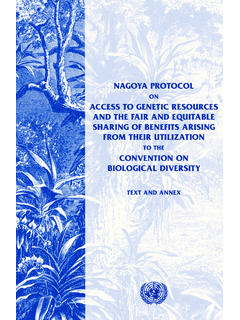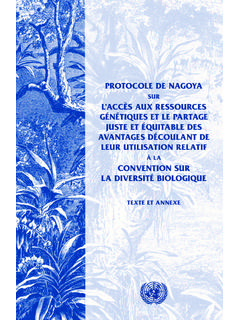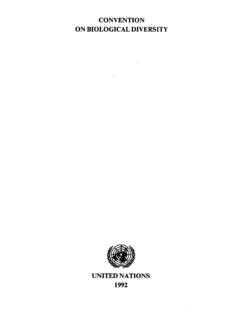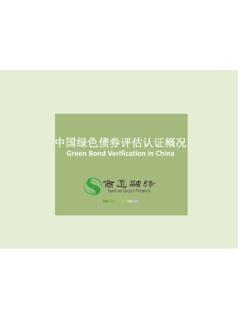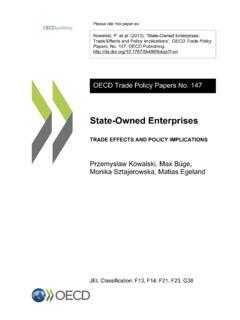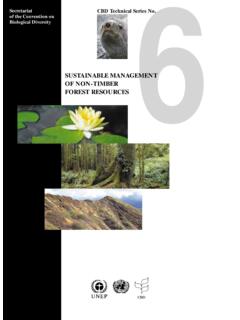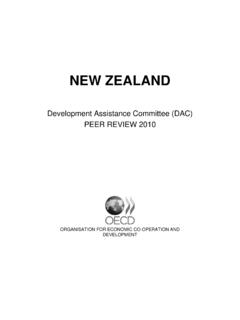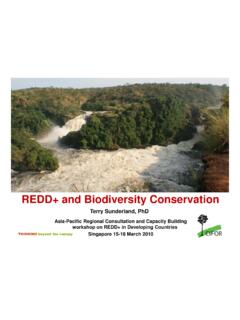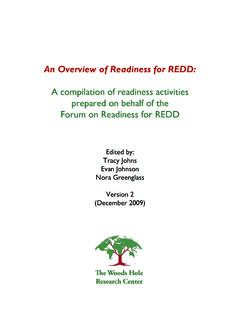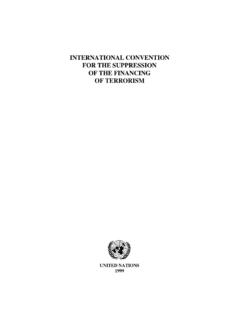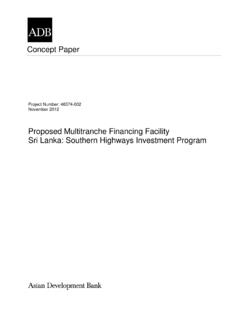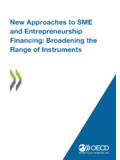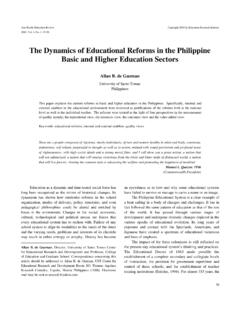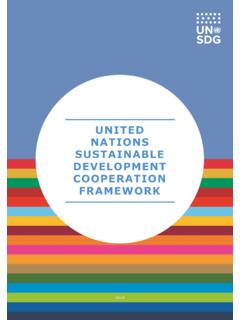Transcription of ECONOMIC INSTRUMENTS FOR ENVIRONMENTAL …
1 ECONOMIC INSTRUMENTS FOR ENVIRONMENTAL MANAGEMENT AND SUSTAINABLE DEVELOPMENT Page 1 UNITED NATIONS ENVIRONMENT PROGRAMME (UNEP) Environment and Economics Unit (EEU) ECONOMIC INSTRUMENTS FOR ENVIRONMENTAL MANAGEMENT AND SUSTAINABLE DEVELOPMENT by Theodore Panayotou International Environment Program Harvard Institute for International Development Harvard University December, 1994 Prepared for the United Nations Environment Programme's Consultative Expert Group Meeting on the Use and Application of ECONOMIC Policy INSTRUMENTS for ENVIRONMENTAL Management and Sustainable Development, Nairobi, February 23-24, 1995 ENVIRONMENTAL Economics Series Paper No. 16 The views and interpretation reflected in this document are those of the author(s) and do not necessarily reflect an expression of opinion on the part of the United Nations Environment Programme Preface and Acknowledgements The plea for a sustainable development path and the need to cope with transboundary and global pollution issues requires the development of new and effective policies in which ECONOMIC INSTRUMENTS have an important role to play.
2 The importance of ECONOMIC INSTRUMENTS for ENVIRONMENTAL policy is emphasized in both the Rio Declaration and Agenda 21, where it was stressed that the use of ECONOMIC INSTRUMENTS represents a tool for national authorities to promote the internalization of ENVIRONMENTAL costs and to apply the polluter-pays principle in the most efficient manner. They provide a means of enhancing the capacity of governments to deal with ENVIRONMENTAL and development issues in a cost effective manner, promoting technological innovation, influencing consumption and production patterns, as well as providing an important source of funding. This volume presents a comprehensive state-of-the-art on ECONOMIC INSTRUMENTS for ENVIRONMENTAL management and sustainable development and reviews the experience of developed countries and its relevance to developing countries.
3 It documents the experience of developing countries in the use of ECONOMIC INSTRUMENTS in ENVIRONMENTAL management. It attempts to delineate the modalities for introducing ECONOMIC INSTRUMENTS in developing countries and countries in transition and human resource requirements and financial implications. Finally it attempts to establish a strategy for successfully introducing ECONOMIC INSTRUMENTS in developing countries. The document makes a successful contribution to the field of ECONOMIC INSTRUMENTS and shows that even in poor countries the introduction of ECONOMIC INSTRUMENTS is a bankable project. The document was prepared as a background paper for discussion for the UNEP sponsored Consultative Expert Group Meeting on the Use and Application of ECONOMIC INSTRUMENTS for ENVIRONMENTAL Management and Sustainable Development.
4 Acknowledgements are due to participants of the Consultative Expert Group Meeting and to the Environment and Economics Unit for their detailed comments to the draft document. I am also indebted to Hussein Abaza of UNEP, Nairobi, for continued encouragement and comments. ECONOMIC INSTRUMENTS FOR ENVIRONMENTAL MANAGEMENT AND SUSTAINABLE DEVELOPMENT Page 2 CHAPTER 1 INTRODUCTION ENVIRONMENTAL policy and management, as originated in developed countries, is divorced from ECONOMIC policy and sustainable development. Having achieved high levels of ECONOMIC development with unrestricted access to resources and unhindered by ENVIRONMENTAL concerns, developed countries sought to protect their environment and ultimately their quality of life from the side effects of ECONOMIC activity.
5 Effects such as air and water pollution, hazardous waste, and more recently, global climate change. In that context, ENVIRONMENTAL management was seen as a necessary restriction or regulation of ECONOMIC activity to contain ENVIRONMENTAL damage within acceptable bounds. Therefore, it appeared reasonable to set ENVIRONMENTAL policy independent of ECONOMIC policy as a set of quantity constraints such as emission standards on the level of pollutants and maximum allowable harvests to stem the depletion of resources. The cost of doing so was thought to be low relative to the high income levels already achieved in these countries.
6 The experience with standards-driven ENVIRONMENTAL policy in developed countries over the past decades suggests that the mandated ENVIRONMENTAL standards and technologies acted as a drag on ECONOMIC growth and costs have been far greater than expected, though still quite affordable given their high incomes (see Jorgenson and Wilcoxen, 1990). This realization has induced developed countries to seek more efficient or at least less costly means of achieving the same level of ENVIRONMENTAL protection through the use of ECONOMIC or market-based INSTRUMENTS . For developing countries and the transitional economies of Eastern Europe and the former Soviet Union, the divorce of ENVIRONMENTAL policy from ECONOMIC policy and from efforts to achieve sustainable development is meaningless and potentially disastrous both economically and environmentally.
7 Where standards of living are unacceptably low, where poverty is a major source and victim of ENVIRONMENTAL degradation, where natural resource exploitation is the engine of growth, where formerly planned economies struggle to restructure and recover, imposing constraints on ECONOMIC activity to protect the environment for its own sake rather than as an input in sustainable development has very limited appeal. Under these conditions, ENVIRONMENTAL policy cannot be divorced from ECONOMIC policy and development strategy. Moreover, under conditions of (desired) rapid ECONOMIC growth and massive structural change, mandated standards and technologies that allow no room for differential response and adjustment to rapidly changing circumstances are both very costly and difficult to enforce.
8 Command-and-controls require the generous use of resources such as capital, government revenue, management skills, administrative and enforcement capabilities, the very factors that are in scarce supply in developing and reforming economies. The challenge for developing countries and transitional economies is to identify and adopt INSTRUMENTS that integrate ENVIRONMENTAL and ECONOMIC policy and that are parsimonious in their use of scarce development and management resources; INSTRUMENTS that allow differential response by ECONOMIC units and adjust flexibly to changing circumstances. The search for INSTRUMENTS of ENVIRONMENTAL management in developing countries and transitional economies is a search for INSTRUMENTS of sustainable development.
9 ECONOMIC INSTRUMENTS meet most of these conditions and are uniquely suited for the integration of ENVIRONMENTAL and ECONOMIC policy and can be designed to advance sustainable development. Despite their many advantages, ECONOMIC INSTRUMENTS are not widely used and their introduction faces many obstacles. First, the experience with ECONOMIC INSTRUMENTS is very limited and much of it comes from developed countries which have used them primarily as sources of government revenues, much less as incentives to alter behavior, and not at all as INSTRUMENTS for the integration of ECONOMIC and ENVIRONMENTAL policy or as vehicles of sustainable development.
10 Given the very different conditions prevailing in developing countries, the developed country experience is not readily transferable; it does, however, contain useful lessons for both developing countries and transitional economies. Second, developing countries themselves have been experimenting with ECONOMIC INSTRUMENTS for some time and although this experience is more relevant, it is anecdotal and largely undocumented. It is also important to note that developing countries are a very heterogeneous group, both in terms of the stage of ECONOMIC and political development and in terms of ecological conditions. These differences limit the direct transfer of developing country experience ( , from Southeast Asia to sub-Saharan Africa).
